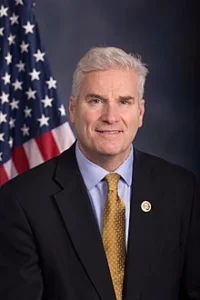by Dennis Dalman
Rep. Tom Emmer of Minnesota’s Sixth Congressional District was nominated on the morning of Oct. 24 to become speaker of the U.S. House of Representatives, but it turned out to be a very short-lived honor because he withdrew his nomination just hours later.
The next day, Oct. 25, a new Speaker was finally confirmed, making Mike Johnson, a Republican representative from Louisiana, the new Speaker of the House. He was elected with 220 votes from the entire House, which was three votes more than he needed to win.
The day before, Emmer and others had quickly realized Emmer would not get nearly enough Republican votes to gain the speakership. So then it was back to a contentious, back-biting, three-week-long struggle to nominate and confirm a House Speaker.
Rep. Emmer (R-Delano) is currently Majority Whip in the House, helping his party garner votes for legislation they favor or oppose. He has represented the Sixth District since January 2015, which was the first of his five election wins. His predecessor in the Sixth District was Rep. Michele Bachmann. The district includes the greater St. Cloud area.
The nomination of Emmer came after five rounds of Republicans voting to decide on a nominee on the morning of Oct. 24. He gained 107 votes in a closed-door meeting of Republicans; more than three other Republican representatives were then vying for the job. In the full U.S. Congress (with both political parties voting), it requires 217 votes to win the speakership.
That outcome was in doubt from the get-go because the congressional Republicans are so widely split between extreme right-wing members and moderate centrists. Because the Republicans hold a very small majority in the House, almost every Republican (and perhaps some Democrats too) would have had to vote for Emmer for a win.
Rep. Mike Johnson came in second in the Oct. 24 vote total, but he then encouraged his colleagues to support Emmer for the speakership. The next day, after Emmer dropped out, Johnson was elected as Speaker. Johnson is considered a staunch conservative; he was among many Republicans who voted not to certify the election results that made Joe Biden president in 2020.
Up until Johnson’s win, there were some right-wing Republicans holding out against support for a Speaker of the House who might prove to be too centrist or moderate, terms that have been used by them to describe Emmer’s legislating style. Former President Donald Trump expressed his dislike for Emmer, which very likely solidified antagonism toward Emmer from the far-right fringe of the party.
House Republicans have been in a chaotic tug-of-war ever since Oct. 3, when former Speaker Kevin McCarthy (R-California) lost the gavel, lost the votes to keep his long-cherished speakership role. Rep. Steve Scalise (R-Louisiana) was nominated but did not garner enough votes. Then Rep. Jim Jordan (R-Ohio) was nominated and also did not get enough votes (after three attempts).
The discord in the U.S. House had become a three-week-long national and international embarrassment and a major concern because a House Speaker is required in order for the House to proceed with any legislation. Such stalled legislation includes aid packages for Ukraine and Israel and a resolution to keep the government open past Nov. 17.
Throughout his legislative career, Emmer has espoused staunchly conservative positions, including a strong opposition to abortion, adamant opposition to tax increases, recently in support to codify protections for those in same-sex marriages, support for an amendment to allow Minnesota to nullify federal laws, support for repeal of the Affordable Care Act and repeal of Minnesota’s minimum-wage law and support for copper-nickel mining in northern Minnesota, among many other issues.

Sixth Congressional District Rep. Tom Emmer (R-Delano).




